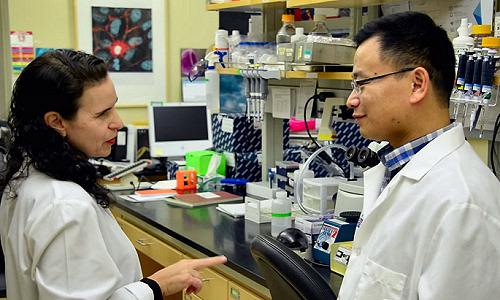Researchers at Huntsman Cancer Institute (HCI) at the University of Utah have found that defects in how cells are squeezed out of overcrowded tissue to die, a process called extrusion, may be a mechanism by which pancreatic cancer begins. From these findings, they may have identified an effective way to reverse the defective extrusion’s effects without destroying normal tissues nearby. The results were published in the latest edition of the journal eLife.
The study focuses on the epithelia, tissues lining the cavities and surfaces of structures throughout the body, including organs such as the pancreas. It is already well-established that most solid tumors arise from this type of tissue.
The team analyzed previous published microarray data and found that a receptor for the lipid sphingosine 1-phosphate (S1P2) that is critical for the extrusion process, is significantly reduced in the most common type of pancreas cancer known as pancreatic ductal adenocarcinoma (PDAC), lung cancer, and some types of colon cancer–all aggressive cancers that resist treatment with chemotherapy.
Focusing on cells from PDAC tumors, the team found that reduced S1P2 levels led to reduced extrusion and cell death rates. About 50% of the cells did not extrude and formed masses, while most of the remaining ones extruded underneath instead of outside the cell layer.
“This kind of altered extrusion may be a common hallmark of invasive tumor types,” said Jody Rosenblatt, PhD, co-author of the study, associate professor in the Department of Oncological Sciences at the University of Utah School of Medicine, and an HCI investigator. “While the mechanisms that drive tumor cell invasion are not yet clear, the results suggest that S1P2-mediated extrusion may play an important role in metastatic cell invasion.”
Normally, signaling through S1P2 triggers epithelial cells to squeeze some cells out to die when overcrowding occurs in order to keep constant healthy numbers. “Usually, cells pop out, away from underlying tissue,” said Rosenblatt. “Looking at zebrafish, we found that when the S1P2 signal is disrupted, cells build up and form masses that resist cell death–even when it is triggered by chemotherapy–or they pop into underlying tissue where they can potentially invade. Also, some cells die without being extruded, creating poor barrier function in the epithelium, which could cause chronic inflammation.”
According to Rosenblatt, decades of previous research has established all these conditions–masses of cells, resistance to cell death, invasive activity, and chronic inflammation–as determining factors of cells becoming tumors and progressing into metastasis.
Normally, extruded cells ultimately die because survival signaling, which depends on a signal called focal adhesion kinase (FAK), is lost. The team tested whether defective extrusion could be bypassed by using inhibitors to FAK. Simply adding FAK inhibitors rescued cell death rates to normal, and surprisingly, eliminated the large cell masses and improved the barrier function.
“Some FAK inhibitors are already being tested in clinical trials for other types of cancers,” said Rosenblatt. “Hopefully, they may also be a better therapy for recalcitrant tumors such as pancreas cancers and some lung cancers.
“Our results so far have focused on the primary tumor or cells invading in culture. Now we need to see if we can target cells that have moved to other sites, or metastasized, with FAK inhibitors, since this is an important feature of pancreatic cancer. That’s the next phase of our study,” said Rosenblatt.
Story Source:
The above story is based on materials provided by Huntsman Cancer Institute at the University of Utah.





